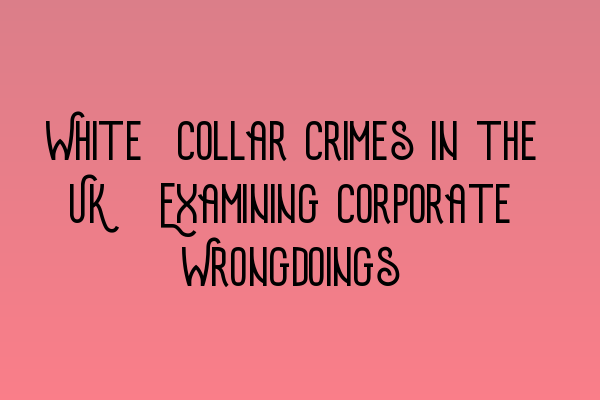White-Collar Crimes in the UK: Examining Corporate Wrongdoings
In recent years, there has been a growing concern regarding white-collar crimes in the UK. These crimes, typically committed by individuals or organizations in positions of power or trust, involve non-violent illegal activities that are financially motivated. Today, we will dive into the world of corporate wrongdoings, exploring the various facets of white-collar crimes within corporate settings.
Understanding White-Collar Crimes
White-collar crimes encompass a wide range of illegal activities, including fraud, embezzlement, money laundering, insider trading, and bribery. These offenses often occur in the corporate sector, where individuals or organizations exploit their positions or manipulate financial systems for personal gain.
Fraud, one of the most prevalent white-collar crimes, can involve false representation, deception, or misrepresentation. It can occur in various forms, such as insurance fraud, tax evasion, or securities fraud. These schemes can cause significant financial losses to businesses, investors, and the economy as a whole.
The Impact on Businesses and Society
Corporate wrongdoings not only impact individual businesses but also have far-reaching consequences for society. The financial losses incurred due to these crimes can lead to layoffs, reduced investments, and increased consumer costs. Additionally, public trust in corporations and financial institutions can be severely damaged, affecting the overall economy and investment climate.
It is essential for companies to implement robust internal controls and compliance programs to prevent white-collar crimes and maintain public trust. This includes conducting regular audits, establishing strong ethical guidelines, and ensuring transparency and accountability throughout the organization.
Legal Actions and Penalties
When white-collar crimes are discovered, legal action is taken to hold the responsible individuals or organizations accountable for their actions. Investigations by regulatory bodies such as the Serious Fraud Office (SFO) or Financial Conduct Authority (FCA) are carried out to gather evidence and build a case against the alleged wrongdoers.
If a conviction is secured, individuals may face significant fines, imprisonment, or both. Companies may also be subject to hefty fines, suspension or revocation of licenses, and reputational damage. Seeking legal advice from experienced criminal defense solicitors is crucial to mount a robust defense and protect the rights of individuals and organizations accused of white-collar crimes.
If you are interested in learning more about the SQE criminal law and practice in the UK, check out our related articles for further information:
- SQE 1 Practice Exam Questions
- SQE 1 Practice Mocks FLK1 FLK2
- SQE 2 Preparation Courses
- SQE 1 Preparation Courses
- SRA SQE Exam Dates
White-collar crimes present a significant challenge in today’s corporate landscape. By staying informed about corporate wrongdoings, businesses and individuals can take active steps to protect against these crimes. Invest in proper compliance measures, seek legal guidance, and promote a culture of integrity within your organization to safeguard against the potential consequences of white-collar crimes.
